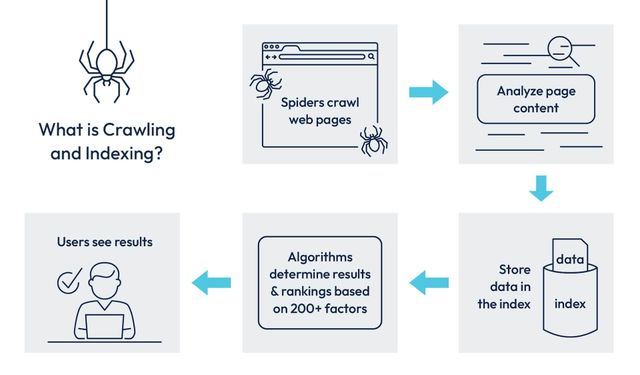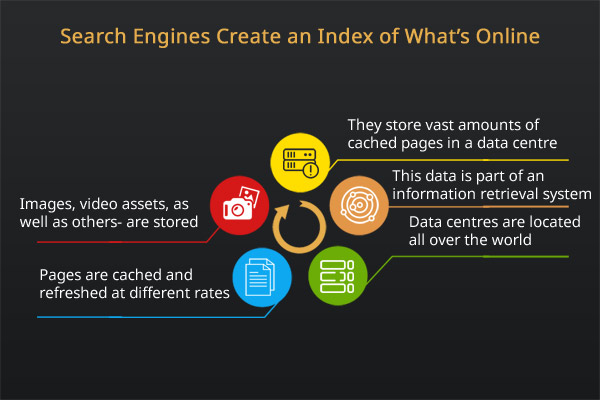Uncover the mystery behind crawling vs indexing in SEO and discover the crucial distinctions that impact website visibility online.

Image courtesy of via DALL-E 3
Table of Contents
Introduction to SEO
SEO, or Search Engine Optimization, is like a magic spell that helps websites show up on search engines when people look for specific things on the internet. Just like you use Google to find information, websites also use SEO to make sure people can find them easily.
What is SEO?
SEO stands for Search Engine Optimization, which just means making your website better so that search engines like Google can understand it and show it to people searching for similar things.
Why is SEO important?
SEO is crucial for websites because it helps them get more visitors. If a website is not optimized for search engines, it might not show up in search results, making it hard for people to discover it. By using SEO, websites can become more popular on the internet.
Understanding Search Engines
Search engines play a crucial role in helping us find information on the internet. Have you ever wondered how Google or Bing magically show you websites when you type in a question? Let’s dive into understanding how search engines work!
What is a Search Engine?
Search engines like Google or Bing are like superheroes of the internet. They scan through millions of websites to find the best matches for your search queries. Just like you have a favorite book or TV show, search engines help you find your favorite websites on the vast internet.
How Do Search Engines Work?
Imagine search engines as super-fast detectives that scan the web for clues (websites) based on your search words. They use special tools called algorithms to sift through websites and bring back the best results. So, the next time you search for something, remember that search engines are working hard to find what you’re looking for!
What is Crawling?
Have you ever wondered how search engines like Google find information on the internet? Well, it all starts with something called crawling. Let’s dive into what crawling is all about!

Image courtesy of www.clickintelligence.co.uk via Google Images
Definition of Crawling
When we talk about crawling in the world of search engines, we’re referring to the process where special web crawlers, also known as ‘bots’ or ‘robots,’ visit websites to read and analyze their content. These crawlers are like little explorers that go from one website to another, scanning and collecting information.
How Crawlers Work
Imagine a crawler as a small robot that follows links from one website to another. It reads the content on each page it visits, looking for keywords, images, videos, and other information. This way, search engines can understand what each website is about and how relevant it is to certain topics.
What is Indexing?
When you search for something on the internet, have you ever wondered how search engines like Google or Bing find and show you the information you’re looking for? That’s where indexing comes in! Let’s dive into what indexing is all about.
Definition of Indexing
Indexing is like organizing a huge library of information so that when you search for something, the search engine can quickly find the right book for you. In the world of the internet, indexing involves storing and categorizing all the information that web crawlers or robots have found on websites.
How Indexing Works
Search engines use indexes, which are like big databases, to store all the information they have found on websites. When you search for something, the search engine quickly looks through these indexes to find the most relevant information to show you. It’s like finding a needle in a haystack, but much faster and more efficient!
Key Differences Between Crawling and Indexing
When it comes to SEO processes, crawling and indexing play crucial roles. Crawling involves the action of finding information on websites, while indexing focuses on organizing and storing this information for easy access. In simpler terms, crawling is like a search engine’s detective work, scouring the web for content, whereas indexing acts like a librarian, categorizing and storing this content for quick retrieval.

Image courtesy of www.rivalmind.com via Google Images
Why Both Are Important
It’s essential for search engines to perform both crawling and indexing tasks effectively. Without crawling, search engines would not be able to discover new or updated information on websites. And without indexing, the vast amount of information found during crawling would be chaotic and difficult to navigate. Therefore, a harmonious relationship between crawling and indexing is necessary for search engines to provide users with relevant and organized search results.
The Role of Keywords in SEO
In the world of Search Engine Optimization (SEO), keywords play a crucial role in helping websites be discovered on search engines like Google. Keywords are specific words or phrases that people type into search engines when looking for information. For example, if you want to find a recipe for chocolate chip cookies, you might type in keywords like “chocolate chip cookies recipe” into Google.
How Keywords Help in Crawling and Indexing
When search engines crawl websites to find information, they look for keywords in the content to understand what the page is about. By including relevant keywords in your website’s content, you make it easier for search engines to categorize and index your site for specific search queries.
Keywords also play a vital role in the indexing process. Once search engines have crawled a website and found relevant keywords, they organize and store this information in their database. When a user searches for a specific keyword, the search engine can quickly find and display relevant websites based on the indexed information.
How to Improve Your Website’s SEO
Improving your website’s SEO is crucial for getting more visitors and increasing your site’s visibility on search engines like Google. Here are some simple tips to enhance your website’s SEO and boost your search engine ranking:

Image courtesy of www.seomelbourneagency.com.au via Google Images
Using Keywords Effectively
Keywords are specific words or phrases that users type into search engines to find information. To improve your website’s SEO, it’s essential to use relevant keywords in your website content. Make sure to include these keywords naturally in your headlines, paragraphs, and meta tags. Avoid keyword stuffing, which is the practice of overloading your content with keywords as this can harm your SEO ranking.
Creating Quality Content
Having high-quality and engaging content is key to improving your website’s SEO. Search engines prioritize websites that provide valuable information to users. Make sure your content is well-written, informative, and relevant to your target audience. Regularly updating your content with fresh and unique information can also help boost your search engine ranking.
Ensuring Your Website is Easy to Crawl
To improve your website’s SEO, you need to make sure it is easy for search engines to crawl. This means organizing your website’s content in a clear and logical way so that search engine bots can easily navigate through your website. You can use internal linking to connect related pages on your site and create a sitemap to help search engines index your pages more efficiently. Additionally, optimize your website’s loading speed and make sure it is mobile-friendly to enhance the user experience and improve SEO.
Conclusion
In this blog post, we learned about two essential processes in SEO: crawling and indexing. Crawling refers to the act of search engine bots visiting websites and reading their content, while indexing involves organizing and storing the information found during the crawling process. Both crawling and indexing are crucial for search engines to effectively find and display information to users.
Final Thoughts
Understanding the differences between crawling and indexing is vital for website owners and marketers looking to improve their SEO. By optimizing their websites for crawling and ensuring their content is indexed properly, they can increase their visibility on search engines and attract more visitors. Remember, using relevant keywords effectively, creating quality content, and making your website easy to crawl are key strategies for improving your website’s SEO.
Frequently Asked Questions (FAQs)
1. What is the difference between crawling and indexing?
When we talk about crawling and indexing in SEO, crawling refers to the process of finding information on websites, like a search engine robot looking through a website’s content to see what it’s about. On the other hand, indexing involves organizing and storing this information so that it can be quickly found and shown to users when they search for something online.
2. Why are crawling and indexing both important for SEO processes?
Both crawling and indexing play crucial roles in how search engines work. Crawling ensures that search engines can find and gather information from websites, while indexing helps in organizing and storing this information so that it can be easily retrieved when someone searches for a specific topic. Without both processes working together, search engines wouldn’t be able to provide relevant results to users.
3. How do keywords relate to crawling and indexing in SEO?
Keywords are like clues that help search engines understand what a website is about. When crawlers visit a website, they look for these keywords to figure out the content and importance of the site. Once the information is gathered, search engines use these keywords to index and categorize the website so that it can show up in search results when someone searches for related terms.







